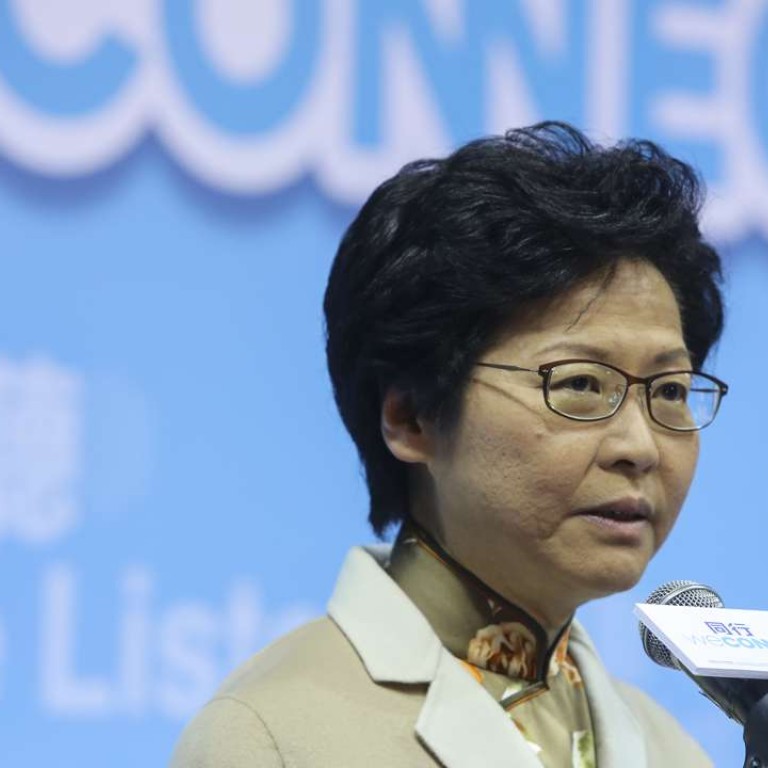
Carrie Lam vows greater role for Hong Kong’s youth
Favourite for March poll avoids fraught issues of election reform and national security laws, at function gatecrashed by pro-democracy activists
The front runner in Hong Kong’s leadership race, Carrie Lam Cheng Yuet-ngor, pledged to take the unprecedented step of including young people in the government’s top policymaking body to empower discontented youth as she rolled out her full election manifesto on Monday.
But she steered clear of proposing any form of electoral reform or reviving any other political hot potatoes at a press conference that was stormed by protesters including leaders of the 2014 Occupy movement.
The former chief secretary, seen as Beijing’s preferred candidate for chief executive in next month’s election, proposed a complete overhaul of the Central Policy Unit, the government’s top advisory body, giving it a new coordinating role above bureaus.
Watch: Carrie Lam presents her manifesto
Addressing livelihood issues, Lam vowed to lower MTR fares by spending away the railway giant’s annual dividends payable to the government, and allow greater flexibility for buyers of subsidised flats to lease out their property through “social enterprises”, even if they have not paid off their outstanding premium.
Just two days before the close of the nomination period for candidates to formally qualify for the race, Lam also revealed she had secured more than 400 nominations from the 1,194-member Election Committee that will pick Hong Kong’s next chief executive on March 26. She will hand them in on Tuesday.
More than a dozen protesters, including Occupy leader Joshua Wong Chi-fung, gatecrashed Lam’s media briefing, chanting, “We want to connect with Carrie Lam,” a variation of her campaign slogan,“We Connect”.
“The political reform was so contentious,” Lam said, referring to the government’s failed 2015 effort to push through a Beijing-backed framework for electing the city’s leader by universal suffrage. “It ended in vain and the ensuing social rift and polarisation was more or less to do with political reform.”
Lam said any new push for electoral reform or implementation of national security legislation under Article 23 of the Basic Law would depend on a “favourable atmosphere”.
She insisted that any further attempts at achieving universal suffrage should still be based on the restrictive framework laid down by the National People’s Congress Standing Committee, which prompted the Occupy protests.
Her stance contrasted sharply with that of election arch-rival John Tsang Chun-wah, who has pledged to resume talks on both issues if he wins. In response to Lam on Monday, Tsang stressed it was “important” to introduce the national security legislation.
Lam appeared determined to go after the Central Policy Unit, which she wants overhauled into a new “policy and project coordination unit” responsible for research, innovation and coordination. The revamped unit – which under Lam would no longer have a say on who should sit on government advisory bodies – would include a team of “20 to 30 young people”, she said.
Lam vowed to use social media to engage the youth. “I’ll make sure the voice of young people will reach the chief executive’s ears,” she said.
Tsang stole some of the limelight from Lam by pouncing on Monday’s Oscar mix-up when the wrong film was named best picture at the Academy Awards.
He posted a comment on Facebook saying: “You will never know the real result until the very end” – a cheeky reference to the assumption that he will lose to Lam.
Additional reporting by Phila Siu

